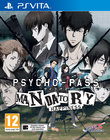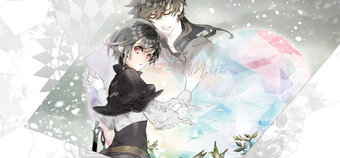There's often a blurry line between visual novels and anime, with popular visual novels finding themselves being turned into anime series all the time, and the same also being true in reverse. Both heavily driven by story and an emphasis on character, it's perhaps easy to see why there's so much cross-over - and why the Psycho-Pass anime provided the perfect setting for a visual novel take.
Set in a dystopian future, Psycho-Pass takes place in a Japan ruled over by a computer program known as the Sibyl System. This ubiquitous program seeps into every part of citizen's life, deciding what jobs they can do, assessing their aptitude for certain tasks, and keeping a close eye on their happiness, via what's known as a hue. To the Sibyl System, people sit somewhere on a scale between being a law abiding member of society, and a no good crook - get put under enough stress, and react negatively to too much stuff, and your hue will start to get cloudy, in turn increasing your likelihood of becoming a criminal. Let your hue cloud too much, and the government will come knocking on your door, ready to take you away for rehabilitation - and that's if you're ever let out again.
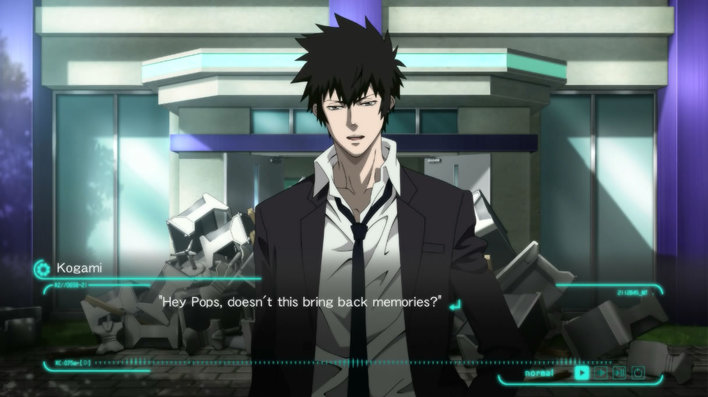
OK, so we're going to be thirty soon, DON'T REMIND US, KO
Psycho-Pass: Mandatory Happiness drops you head first into the oppression, playing as a member of the PSB - the Public Safety Bureau. Charged with monitoring the mental health of the public, and apprehending those with clouded psycho passes - or worse, those who've become latent criminals - it's up to you to investigate any crimes that occur, working alongside a load of familiar faces from the TV series.
You're actually given the choice of playing as one of two main characters here, neither of which are from the anime. First up is Nadeshiko Kugatachi, a stone cold, emotionless husk of a woman who can't remember anything of her past - seemingly including how to process human emotions. The slightly more interesting path, however, is Takuma Tsurugi, an enforcer for the PSB who's searching for a childhood friend that went missing, and who has a much more tortured backstory.
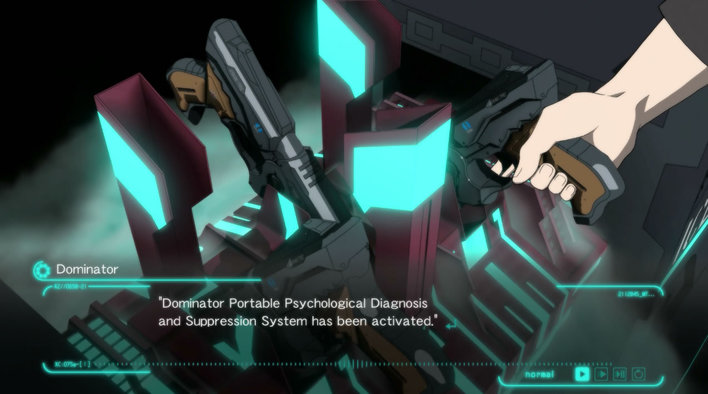
Your dominator is a kind of super sci-fi gun - pointing it at a person will tell you their hue and crime coefficient, with the gun automatically switching to stun - or kill.
The PSB operates on a kind of heirachy, with inspectors at the top, and enforcers at the bottom. Enforcers are those who've been diagnosed as "latent criminals" and as such, cannot be released back into society again. Tsurugi is one such latent criminal, yet also a very human one, who brings a rather interesting perspective to the game.
While you may have a choice of characters to play as, the plot the story follows is the same - the only difference being there's a few different branches, and you get to see a different perspective on certain situations. The plot here follows a spate of incidents that, while they may not appear to be in any way related, all have something in common when you look beneath the surface. First, an unstable teenager kidnaps his young crush; then an cyborg shell goes missing from a medical establishment, and a young mother goes on the run with her baby, after attacking her first born. Pyscho-Pass the anime never shied away from controversial, or heavy hitting subjects, and Mandatory Happiness is no different.
In terms of gameplay, though, while games like Danganronpa and Virtue's Last Reward had you investigating crime scenes and solving puzzles respectively, Psycho-Pass has neither. Instead, this is a pure visual novel, and you simply press X to make the story progress, choosing an option here or there to take a certain action - and that's a large part of what lets it down.
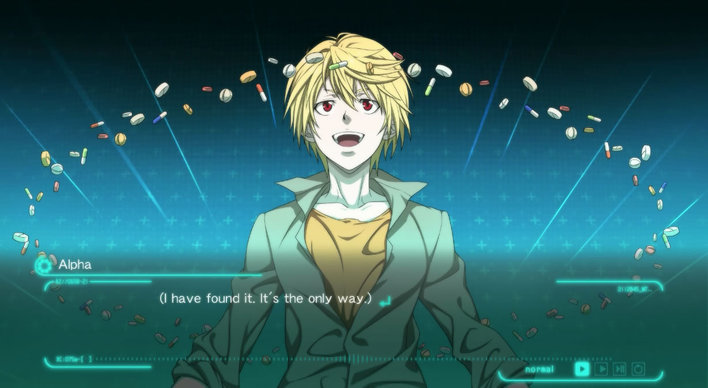
Yes, my pill halo will save the world!
It's not necessarily the linear format that's the issue here, but the fact that the lack of investigation means the game relies almost entirely on its story, and the quality of its writing to see it through - and unfortunately, neither are really up to snuff. The story itself may be OK, but it's often left confusing and tricky to follow due to the somewhat unpolished script. You'll often find yourself having to re-read things several times to make sure you're following, as characters butt in with comments that seem totally unrelated, or actively contradict whatever it is you're talking about at the time. There are several sentences in here that seem to make no sense at all, and just leave you scratching your head.
Then there are the technical issues. Whenever a character says anything, their avatar will appear on screen first - but there's a strange lag whenever this happens. Rather than immediately appearing, you'll wait for a second, perhaps slightly longer, with nothing at all happening, before the character starts to slowly fade in. When you've got so much dialogue to get down, and when conversations tend to jump between three, four, or even more characters, it soon becomes frustrating.
What that means in practice is that the game's pacing ends up being completely off, and what should be a gripping investigation that sucks you in even more as it nears it conclusion, ends up simply feeling more like a chore. The characterisation isn't strong enough, and the story isn't clear enough to keep you playing this until the small hours of the morning, just to see what happens next - unlike, say, something like Danganronpa.
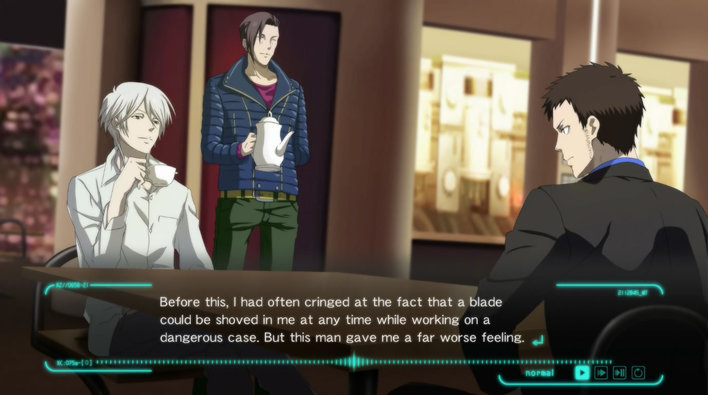
It must be the tea. There's something sinister about tea drinkers.
Another thing that makes the game that little bit harder to follow is the character's names - or at least, how they're used in game. When a character's talking, the game will only show you their surname, so that's how you'll come to know each character - Tsunemori, Ginoza, Kunizuka - yet when characters refer to each other, they'll sometimes do it by first name, surname, or a shortened version of either. It may not sound like much, but it actually makes the story that much trickier to follow, as you have to think for a few seconds to figure out who's talking about who - something that would easily be solved by displaying both a character's names when they're talking, so you learn them quicker. It's also frustrating that you have to press X to progress through the dialogue - being able to tap the touch screen makes it so much easier to play games like this in bed...
While the game does have branches, where the story changes based on your decisions, it's actually hard to figure out how and why these happen. While the game gives you a handy icon to let you know a branch has just taken place, they never seem to be obviously linked to anything you do - rather than appearing straight away after you've made a decision, the branch icon will instead pop up half an hour down the line, leaving you no idea what you did to change things...
While Virtue's Last Reward provided a fantastic flow chart timeline, showing you exactly where the branches took place, and letting you jump from branch to branch so you could see everything the game had to offer (and find the "true" ending) Mandatory Happiness offers nothing like that either, meaning the branches, for the most part, always remain something of a mystery.
While it's not at all bad - the story may take a while to get going, but it does get interesting towards the end, and there's a tile-matching mini-game you unlock that's a lot of fun - it's fair to say that Pyscho-Pass: Mandatory Happiness still represents something of a missed opportunity. With such a dark anime as its source material, this could really have capitalised on the nightmarish future, but instead, ends up stumbling over its own script, leaving a story that's lacking.
Format Reviewed: PS Vita


